Given that I have to professionally wrap my head around roughly 1,267 new albums every week – or something like that – in my role as album reviews editor for BBC.co.uk, please do allow me this article of unashamed nostalgia (read: vanity). If nothing else, it’s a reminder to me that while most new music matters for a week, some from my own lifetime will sing its songs into future generations.
Being in 2012 makes the sounds of 1997 seem ever so old on ‘paper’ – yet the year, for me, is yet to be bettered in terms of life-impacting long-play releases. Naturally my age plays a part, but nonetheless, some brilliant LPs were released in the year that Princess Diana died so that Rebecca Black could be born (though perhaps these events were unrelated). And while the choices below are not as fresh as they once were, they each retain potency a full 15 years on from their first release.
I’ve no doubt that many a reader will scan these selections and feel memories of what they soundtracked flooding back. For slightly younger sorts (yes, I am jealous of your non-greyed hair and relatively pure livers), perhaps they will act as windows into a period of this listener’s musical education. At the time, anything released before 1990 seemed woefully archaic, as the dazzlingly nature of these sets cast such shadows as to shroud so-called classics of yesteryear in the darkness of irrelevance. I can listen to these albums today – and have done so while putting this together – and fall in love with them all over again. Well, most of them.
So, please: take an afternoon off, explore these releases, and join me in celebrating perhaps the most bountiful musical year of my life, and perhaps yours, so far.
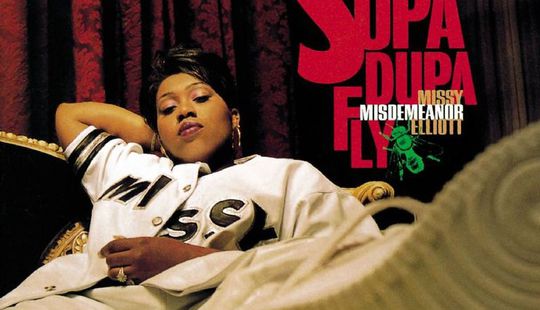
Missy Elliott – Supa Dupa Fly
(July, Elektra)
Rap got weird in 97 – or at least it seemed to from where I was standing. My experience of beats and rhymes was strictly limited before then – I could get down to the Judgment Night soundtrack, but that featured the likes of Slayer and Helmet beside De La Soul and Run DMC, and would occasionally let a (part-time, after-college) work colleague put 2Pac on between my ‘indie’ picks. But, generally, my appreciation of rap was completely disconnected from my love of it today, and this album has much to do with that. A clutch of late-90s releases seemed to reposition the genre as rather more intelligent and inventive than was previously suggested, and Supa Dupa Fly shined the brightest of any game-changer. Missy then-‘Misdemeanor’ Elliott had been writing and recording for some time ahead of this debut, most notably beside Timbaland and for Aaliyah, but what a way to make a mainstream entrance in a solo capacity. Doors, blown, off. Grammy nominations and platinum sales followed, and Missy’s career would go absolutely nuclear in this release’s wake; but, arguably, she’d never release another long-player of such consistency. Seeing the video for ‘The Rain’, I mean… music television had never looked like this before; rap had never sounded like this before. Male dominance was broken in a bar. Missy was – is – completely unique. Everything anyone thought they knew about commercial rap changed in a staccato heartbeat.
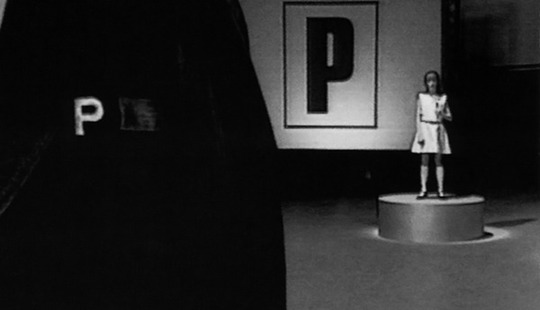
Portishead – Portishead
(September, Go!)
In a brilliant move of middle-finger-up, expectations-eschewing awesomeness, rather than capitalise on the coffee-table qualities of their (actually rather haunting) Mercury Prize-winning debut, Dummy, Portishead decided to concoct their bleakest collection to date for album two. The DJ at a college soiree – I hesitate to recall it as a prom, for fear that American-o-phobes will come down on me harder than a writer with a penchant for the term ‘sophomore’ – played a cut from this to close said shindig (or, at least, he played it near the end). I remember thinking such a move was fairly audacious since this set possesses all the slow-dance appeal of an abattoir recording of the slaughtering of several hundred squealing pigs. Respect to that man, whoever he was. Still my favourite Portishead set, this self-titled affair encapsulates the group’s very darkest tendencies – Third was special (is special), but happenstance and history has locked this down as my preferred soundtrack to slow decay.

Björk – Homogenic
(September, One Little Indian)
This was the album that had me finally clicking with Björk after enjoying tracks from her previous two LPs but never quite committing to her singular cause for the duration of an LP. Homogenic mixes the romantic with the raucous, electronic elements with a wonderfully organic soul. I bought this album for my then-girlfriend, now wife, ahead of her going travelling – it’s perhaps needless to say I played it a fair bit while she was overseas. So yeah, it’s a special one. Amazing regardless of such an emotional connection, too, as experimental as it is accessible, a perfect balance of the avant-garde and instant-click. And its closing number is the most elegant fusion of warm orchestral tones and icy electro chatter ever realised. “The most beautiful song ever written,” reads a top YouTube comment, and sometimes it’s hard to hear beyond it.
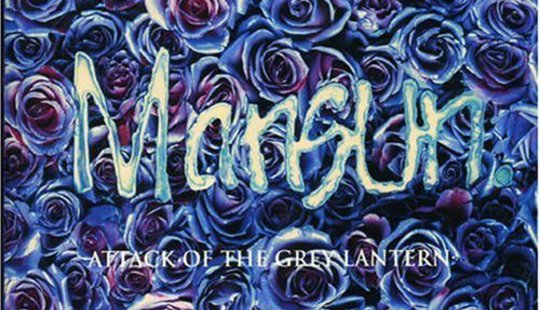
Mansun – Attack of the Grey Lantern
(February, Parlophone)
One might look to Oasis’ Be Here Now as the album that burst the Britpop bubble – but Mansun’s debut, released some months earlier, played its part in shattering the scene’s set pattern of swaggering dicks in Kangol hats and Kickers boots spouting innane tripe in regional tones over music that Ray Davies could have splurged out in a few seconds. A number one album in the UK, this kicked Britpop in the balls, nicked its cricket bat and proceeded to beat it about the bonce until thoughts of All Change and Moseley Shoals were smashed into teeny weeny pieces. Intelligent but not show-off-y with it – that would come with second album Six, for better or worse depending on how you were listening – the largely self-produced Attack of the Grey Lantern flirts with concept-piece infrastructure but goes all out with pop hooks enough to land the North Atlantic’s stock of cod in an afternoon. It managed to be both prog and punk within the same hour. I loved it. Perhaps that’s apparent.
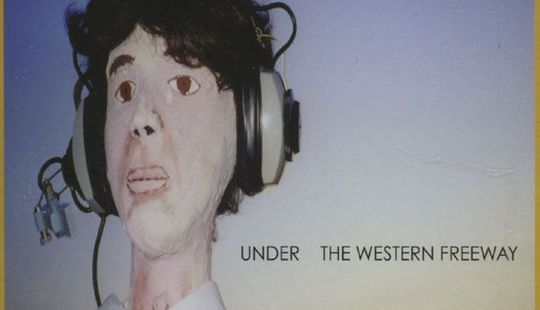
Grandaddy – Under the Western Freeway
(October, Will/V2)
The first dance at my wedding was Grandaddy’s ‘A.M. 180’. And it was impossible to ‘first dance’ to, with everyone looking, like they do. I felt like a dick. But, there’s a very good reason said selection began the post-dinner frolics – it’s touching, sincere, and very catchy. In short, it is an amazing song, a highlight from this generation’s indie collection. Truth be told the whole of Under… isn’t in the same league, but it’s not without its share of standouts: ‘Summer Here Kids’, ‘Go Progress Chrome’, the elegant melancholy of ‘Everything Beautiful Is Far Away’. ‘A.M. 180’, though: what a wonderfully life-affirming slice of pop-rocking magnificence it remains, swelling with uncommon beauty while nailing a motif that just won’t quit grating against the grey matter. And yes, yes… Charlie Brooker blah blah bothered. Can’t find an official video, so this’ll have to do.
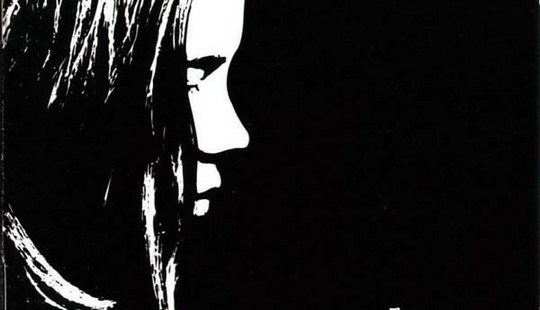
The Chemical Brothers – Dig Your Own Hole
(April, Virgin)
For a brief while, I was a member of the Britannia Music Club. It meant getting selected-by-someone-else CDs through the post once per month (which I usually did not keep); but also opened up an array of money-saving offers which, given CDs could be over £15 in my not-actually-all-that-local HMV at the time (seven miles by slow-ass bus), was a treat. Dig Your Own Hole was one of my introductory five-for-the-price-of-one (or some such deal) selections, and by far the most significant to my developing earholes, as borne by the fact it’s the only one I remember being part of that first order. In my mind this set marks the point where what was indie and what was dance collided with irrevocable results, as beats found fine bedfellows in guitars and it briefly seemed like jokers in the mould of Bentley Rhythm Ace could become certifiable pop stars. Of course this music’s makers have outlasted many (all?) of their ‘big beat’ peers, primarily through being light years ahead of the pack in terms of both inspiration, in their original sounds and cleverly co-opted samples, and perspiration, as they soon set about becoming the second-best live dance act in the world, behind the brain-frazzling show Daft Punk have been known to put on. (Honestly, my mind melted during the Chems' Glastonbury 2000 set.) Chemical beats became block-rocking ones, and the whole world shuddered. And the Britannia Music Club went out of business. Serves them right for sending me a fucking Finley Quaye CD.
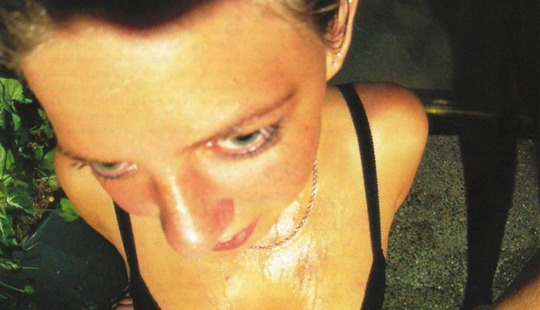
Deftones – Around the Fur
(October, Maverick)
We can all agree, a decade-plus after said sounds first started up stateside, that nu-metal was a very bad thing indeed. Deftones were, I’d like to say categorically (but their first collection, and some tracks on this follow-up, spoil my argument somewhat), not-nu-metal. They were too clever by half, and come 2000’s White Pony were so far from the nu-metal source that one was as likely to find Cure fans at one of their gigs as they were Korn followers. Around the Fur is, then, a pivotal release, pointing towards a radical future while paying its dues to the dunderheaded drivel that surrounded its makers’ early rise from unknowns to Madonna-on-speed-dial heavyweights. At its most brutal, this set is concerned solely with head-banging bravado; but there’s an underlying tenderness to so many cuts, not least on standout single ‘Be Quiet and Drive (Far Away)’, and it’s this depth that would carry through to White Pony and beyond. Listening now my skin still prickles with the same excitement of 15 years ago – and seeing them live in 98 really cemented my love of this evergreen outfit.
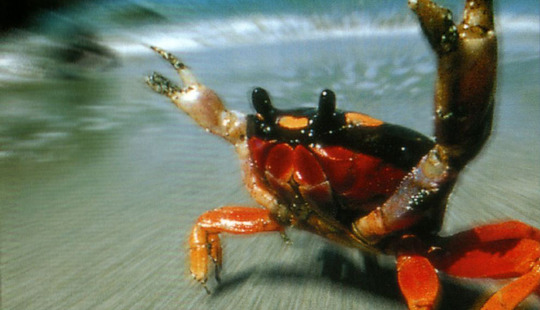
The Prodigy – The Fat of the Land
(June, XL Recordings)
Because no matter your tastes, and no matter where you were in the world, there was no escaping The Prodigy in 96/97. Via ‘Firestarter’ the previously-sorta-underground dance act exploded onto television sets and immediately swung the zeitgeist in their direction. If they upset a few grannies, fuck a few grannies; this really felt like our music, unprecedented and explosive, impossible to imagine mattering to any other generation. Truly, if there’s one album that nails the spirit of the 90s to a mast and then sets fire to the thing, cackling manically as flames finger upwards, it’s this one. Not Definitely Maybe, nor Parklife, nor Urban Hymns, nor Blue Lines: this one. Its is decadent and destructive, filthy dirty and dizzied by fits, self-absorbed and nihilistic, blood red and white riots and blue movies. It is bloated and bombastic and its heart is blacker than night. Yet it screams for freedom, for the future today, for unity towards a common goal. It is violence and vindication, celebration and carnage. And it even makes Crispian Mills sound (fleetingly) credible. One can only imagine how different New Labour’s time would have been had Keith Flint and Maxim Reality followed Noel Gallagher through the door of Number 10 for a smile-please shake-and-fake.
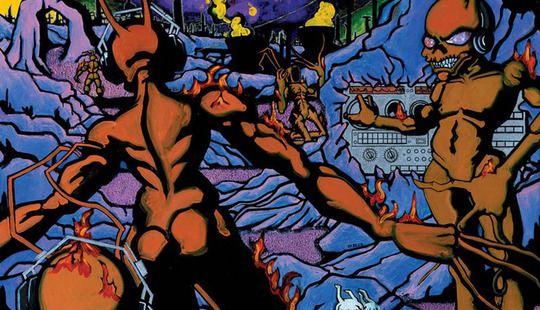
Company Flow – Funcrusher Plus
(July, Rawkus)
Full disclosure: I definitely did not own this album in 1997. (Yeah, I’m cool, but not that cool.) I bought it later after discovering the New York hip hop trio’s ‘8 Steps to Perfection’ on a Select magazine cover-mount. Rough about its edges and consumed by claustrophobia, this is how I wanted my hip hop to be as a still-impressionable late-teenager: without the sunshine of the charts, without the smile of Will Smith, without prospects of breaching the mainstream to any extent. Yet while Missy made herself an icon on her own terms, Company Flow struggled to keep key professional relationships intact, and soon were scattered to the winds of almost-but-not-quite success. Yet Funcrusher Plus saw its reputation flourish as its makers set about alternative concerns, and the trio reformed for a hometown show in 2007 before playing at a Portishead-curated I’ll Be Your Mirror event last summer. The record is regularly cited on the DiS messageboards as a classic of its kind, and that there community, it knows right from wrong. Sometimes. Personally, it’s one of a select few hip hop LPs of the 90s that I can fire up today without feeling that it’s aged poorly.
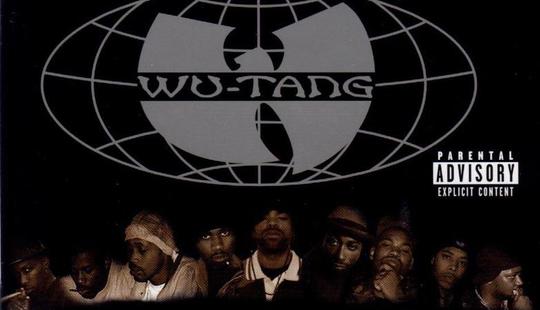
Wu-Tang Clan – Wu-Tang Forever
(June, Loud)
I know it says “classic” right up there, in the title, but Wu-Tang Forever probably doesn’t quite qualify for the status. But that said, it mattered to me in 97, when I picked it up based on a five-star Select review. (Said magazine would retract the score in a later issue, and instead highlight the double-disc collection’s myriad flaws.) Dense and difficult, this was progression, certainly, from the Clan’s comparatively taut 36 Chambers debut of a full four years earlier – but progression of a kind that didn’t exactly click with everyone, as it gave over too much time to the group’s less-appealing members while the RZA’s production shifted from sharp edges to gloopy excess. However, trim the fat from these 29 tracks and what’s left is a perfectly decent, at times magnificent, follow-up to an always-unlikely-to-be-bettered first collection. I certainly slogged my way through the more underwhelming cuts to find what I felt were highlights: ‘Bells of War’, ‘Triumph’, ‘For Heaven’s Sake’, ‘Hellz Wind Staff’ and Ol’ Dirty Bastard’s depraved ‘Dog Shit’. That only three of these tracks made 2004’s best-of set, Legend of the Wu-Tang, says much about its selective appeal.
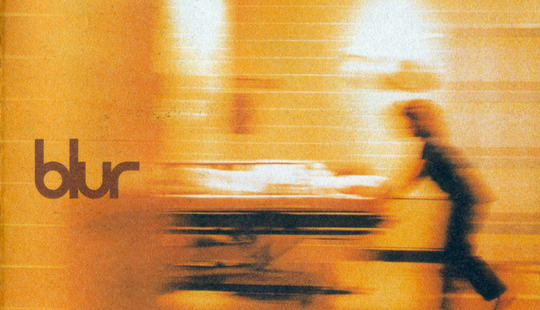
Blur – Blur
(February, Food)
AKA: when Britpop grew up, threw a paddy and set about cracking the US properly. That it had to lock itself away in Iceland – the country, not the supermarket – to do so is a curious aside. If you’ve never listened to Blur’s eponymous fifth set, be prepared that ‘Song 2’ is hardly indicative of its playfully experimental, grungey lo-fi feel. Lead single ‘Beetlebum’ is perhaps the strangest (all-about-smack) number one of its decade, and On Your Own sounds like a lad’s night out inside Kraftwerk’s man-machine mindset; elsewhere, ‘You’re So Great’ is the first lead Blur vocal from Graham Coxon, and amongst the sweetest numbers this outfit ever crafted. Yeah… Blur were pretty bloody marvellous, so it turned out.

Mogwai – Mogwai Young Team
(October, Chemikal Underground)
A cheery wave from stranded youngsters? Hardly: …Young Team was many things – hugely influential, impressively fully formed, a dynamic instrumental collection on which an absence of vocals (a fine turn from Aidan Moffat on ‘R U Still In 2 It’ aside, of course) was never lamented – but cheery doesn’t spring right to mind, and nor were its makers grounded in their hometown of Glasgow once the rumbles of this debut set were heard worldwide. A 9.7 in 97 score from Pitchfork, downgraded to 9.2 come a 2008 reissue, sold these Scots to the States – and from there, the post-rock world was theirs for the taking. Hang out at ATP and see how many tattoos of this record’s ‘MYT’ logo you can spot – some, I bet you. Personally, …Young Team opened a world of new music to me, as from this band’s celebrating of their influences I found Slint, Don Cabellero and more. They’re an archetypal access band, to this day: a newcomer’s delight whose material illuminates what has come before, thus facilitating exploration anew.
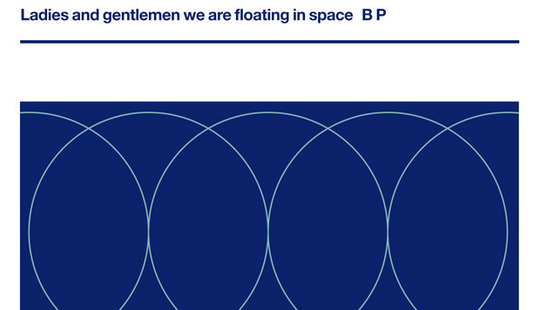
Spiritualized – Ladies and Gentlemen We Are Floating in Space
(June, Dedicated)
1997’s discerning indie fan typically fell into one of two factions: Radiohead or The Verve. But there was a small breakaway sect whose preferred indie-but-not-really LP of the year was this, Spiritualized’s third album and certainly the band’s most ambitious to that point. A perplexing, soul-soaked psychedelic trip through Jason Pierce’s post-break-up state of mind, encompassing a raft of influences so vast as to fill dozens of albums by this band’s lesser-inspired peers, Ladies and Gentlemen… is an enveloping delight that flies through its 69 minutes without missing a beat. A special edition run featuring medicine-style ‘blister’ packaging threatened to promote the aesthetic appeal of the collection over its superb sounds; but the set’s legacy speaks for itself, as since-released reissues have expanded its palette to include bonus discs of equally impressive material that didn’t make the original cut. By turns cautiously introspective and cacophonously triumphant, Ladies and Gentlemen… was NME’s number one album of 1997, and certainly one of my favourites, even if I am yet to see the band really deliver in the flesh (extra-gutting after 98’s incredible Albert Hall live release). I know, I know – right place, right time, they’re phenomenal. Perhaps sometime in the next 15 years…
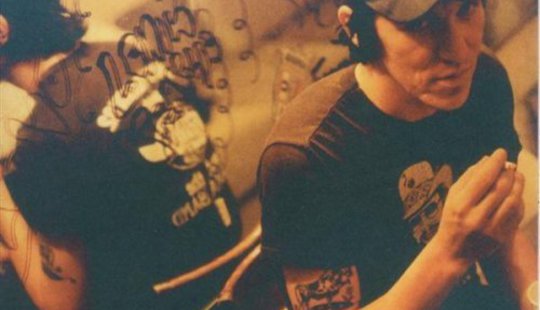
Elliott Smith – Either/Or
(Kill Rock Stars/Domino, February)
Fame calls at unexpected times. Elliott Smith’s third album was the best part of a year old by the time Gus Van Sant’s Good Will Hunting highlighted the songwriter’s incredible talent via its soundtrack, which featured several Either/Or songs. His exclusively penned number for said flick, ‘Miss Misery’, wouldn’t appear on an Elliott Smith album until the posthumous New Moon collection of 2007; so it was to this album that new fans turned (hello, me). 1998’s XO saw Smith take the leap, successfully, to a major label, and from then onwards it seemed his star would never wane. Of course, we know what ultimately happened in 2003 – although the tragedy of his death lingers on, as no closure has really been reached concerning its circumstances. Be his death suicide or not (likely, yes), it’s evident here, on a really special album, that a massive talent was lost.
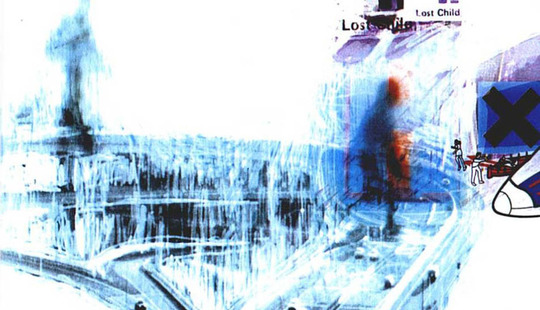
Radiohead – OK Computer
(May, Parlophone)
You were expecting Be Here Now? I spent a night in a bus shelter after seeing this band tour this album, in a city far away from home. That kind of commitment doesn’t accompany any old release. This is, probably, my favourite album of all time – well, it is today, anyway. You know how it is: tomorrow it’ll be one of these discs cluttering up my desk, a week-long classic that I’ll have forgotten about come this time next year.
DiScuss: Go on then, what’s are your favourite albums of 1997? Does listening to these songs make you feel old? In the end, we all get creaky knees, I suppose…






















